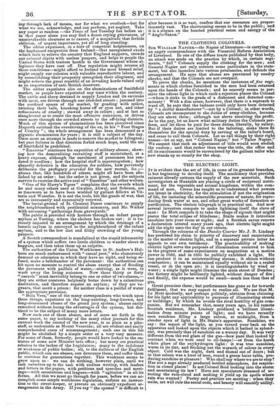THE CLOTHING COLONELS.
SIR WILLIAM NAPIER—the Napier of literature—is carrying on an angry correspondence with the Financial Reform Association of Liverpool. In one of the diffuse tracts published by that body, an attack was made on the practice by which, in certain regi- ments, " full " Colonels supply the clothing for the men ; and General Napier not only corrects some particulars in the state- ment, but also launches into various petulancies, and defends the arrangement. He says that abuses are prevented by sundry checks, and that the Colonels are not overpaid. To prove the checks, he mentions the instances of five regi- ments in which clothes furnished to the men had been returned upon the hands of the Colonels ; and he scarcely seems to per- ceive the odious light in which such a rejection places the Colonel —whom it sinks to the grade of a dishonest and detected com- missary ! With a dim sense, however, that there is a reproach to ward off, he says that the badness could only have been detected by " a skilful manufacturer"—not by a Colonel; in other words, Colonels are incompetent to the duties of army-clothier, because they are above them ; although not above receiving the profit. As to the pay, let us know what military duties the Colonels per- form, and let them be paid for those duties, liberally, by salary. But if their duties are limited to the tailoring, make them fit themselves for the special duty by serving at the tailor's board, and cease to call them Colonels. Let us call things by their right names—let us say, not " Colonel Napier," but " Tailor Napier." We suspect that such an adjustment of title would soon abolish the custom ; and that rather than wear the title, the office and all its emoluments would be surrendered by the gallant tailor who now stands up so stoutly for the shop.


























 Previous page
Previous page